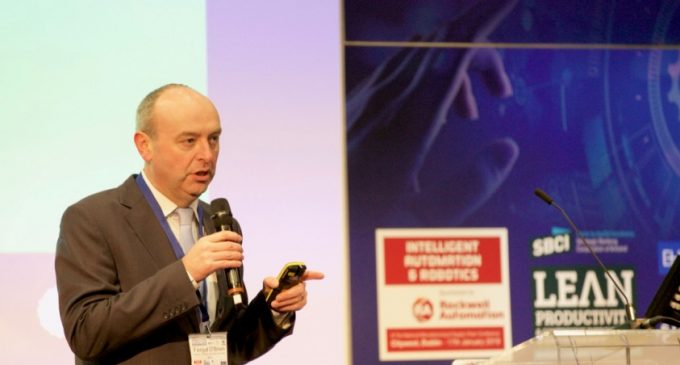Irish Manufacturing Renaissance in Peril

“Manufacturing is incredibly important to our economy and we are going through a ‘Renaissance’. Our economy has been performing strongly and manufacturing is at the centre,” said Fergal O’Brien (pictured), Director of Policy and Chief Economist, IBEC, when addressing the recent National Manufacturing and Supply Chain Conference at Citywest Hotel in Dublin.
“Ireland is one of the wealthiest economies in the world because Irish companies have embraced international opportunities.” He elaborated: “The Irish economy is unique. We have found a resource like oil – in our case it is intellectual property.”
“Right now in Ireland we are investing twice the European average in equipment and machinery,” he pointed out.
During his presentation – ‘The evolution of Ireland’s manufacturing sector’ – Fergal O’Brien identified a number of distinctive characteristics of the country’s manufacturing sector as it has evolved from ‘farm to pharma’ and beyond.
Ireland’s manufacturing sector had been constantly developing and the nature of industry has changed completely as companies have successfully moved up the value chain. The Irish manufacturing sector has established a global footprint and is at the centre of many global supply chains. For example, Ireland produces a fifth of all infant formula globally. Indigenous companies have been successfully internationalising, while foreign companies have picked Ireland as a manufacturing base. Irish manufacturing firms currently employ almost 100,000 people in the US.
An increasing number of Irish companies are investing in R&D and Ireland is now at the cutting edge of technology globally. Ireland has a ‘world class’ manufacturing industry as evidenced by the high number of Irish companies being awarded the Shingo Prize, the world’s highest standard for operational excellence.
The country has become a global manufacturing hub. For instance, all of the world’s top ten technology companies are located here as are 18 of the top 25 medtech companies globally. The development of clusters has allowed manufacturers to work across different sectors and to learn from each other. Because Ireland is a small country, networking is relatively easy.
The Irish manufacturing sector is also supporting regional development by spreading economic growth beyond Dublin, as illustrated by the medtech sector.
However, Ireland is in danger of losing its economic competitiveness. “The key to competitiveness is not always cost – the key is innovation performance,” Fergal O’Brien stressed.
Using rising corporation tax revenue merely to run the day to day operations of the State will not sustain Ireland’s competitiveness in global markets. “We need to invest more in infrastructure, the educational system, R&D and innovation to maintain our competitiveness.”
He concluded: “It’s an exciting time but also a perilous time, if we don’t make the right choices.”

























